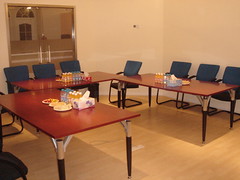A full-blown focus group, which includes recruiting a representative panel of participants ($1,000 to $1,500), paying for their time to attend ($20-$50 per person), refreshments for the event ($200, plus), renting out a location ($200-$700), hiring a competent moderator ($75 to $300 per hour or $800 to $1,500 per day) and analyzing the results ($1,000 to $2,000), can be very expensive.
Depending on the moderator, and if there are any travel costs, it can run between $3,000 and $10,000 per group. Most experts recommend five or more focus groups to help verify the results, making focus groups a very expensive research tool.
However, focus groups are an extremely valuable insight into the mind of your stakeholders. And while blogs and monitoring of consumer sentiment, or what really is content analysis, is beneficial, it doesn’t do the same job as a focus group.
So, what can one do to offset this cost and still get the benefit of the focus group format?
I have found a terrific tool that I have been personally using is a group of books called “The Focus Group Kit.” It isn’t cheap (at $155), but given the prices I quoted above, if you are interested in focus group research, it is a Godsend (No worries, I am not getting kickbacks from Amazon, I just found it was cheaper there than at Barnes and Noble).
It was largely authored by Richard Krueger, a professor at the University of Minnesota, and a well-known expert on the subject of focus groups and other evaluative research.
One of the books in the series is Involving Community Members in Focus Groups, which would be a great read for non-profit organizations and those on very limited budgets. While it is a great luxury to hire a professional moderator, I am aware that some organizations just don’t have the resources to do so.
In a focus group I recently moderated, we were able to work with a consumer association to conduct all of the recruiting, I just followed up by calling each participant to make sure they qualified. The consumer group also got the room for free and paid for the refreshments in exchange for accessing the report results. My client only had to pay for my time, and I am on a retainer, so most of that was folded into the cost of the retainer, minus expenses. We gave the participants a $25 Visa card, and gave our volunteer helpers $50 Visa cards. Not much more than $500 was spent on that. My point is that you can really do this for much less than you would expect if you are creative.
Krueger’s has some handouts of his advice for focus group interviewing available free at his web site. You can start with these, but I still recommend you get the whole series if you are serious about conducting your own focus groups. In the Moderating Focus Groups book, there is also a great chapter on conducting rapid focus groups, which is great for those involved with any kind of crisis communication planning and execution.

[…] Determine customer service requirements through surveys, focus groups and benchmarking best practices; and analyze data to identify strategies for improvement of […]